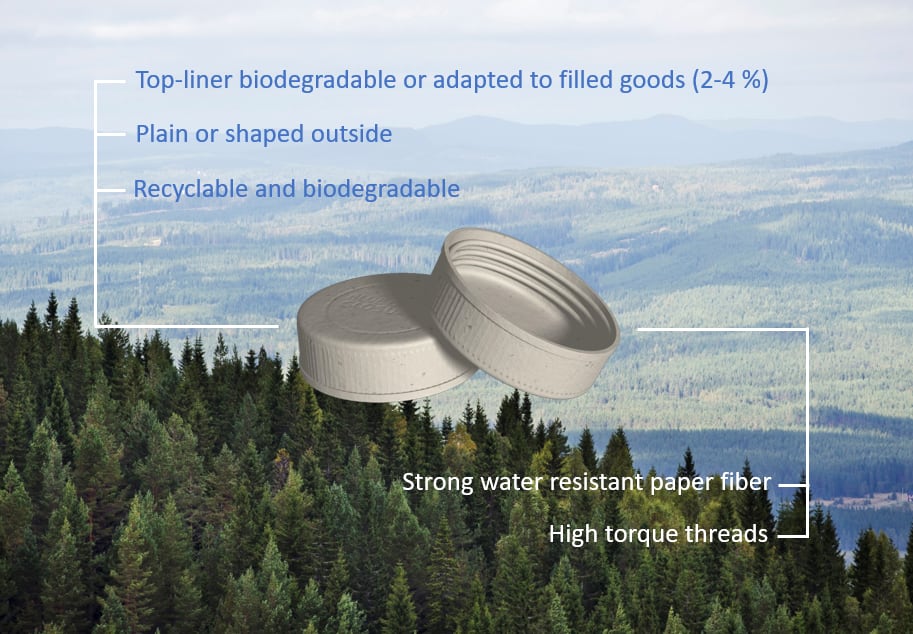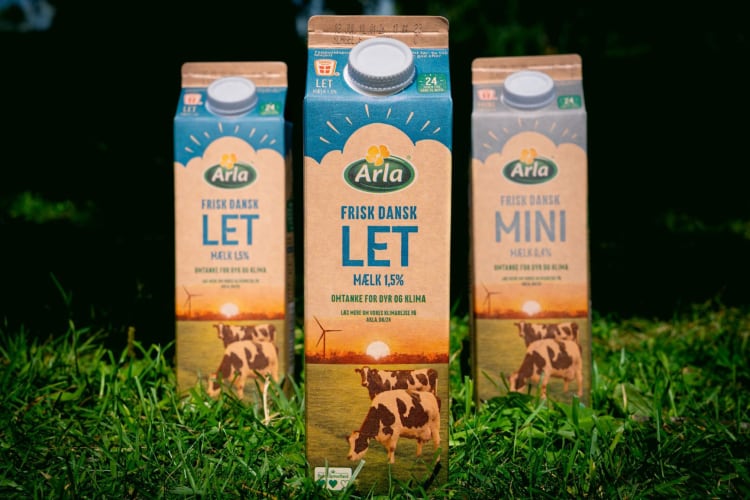Arla Foods is partnering with Swedish start-up Blue Ocean Closures in a bid to create what would be the first fiber-based caps suitable for use on milk cartons. The cap is made of FSC-certified fiber material and thin barrier coating and is biodegradable and recyclable as paper.
Plastic from screw caps makes up around 23% of the total plastic used in Arla’s milk cartons; removing it would reduce the co-op’s plastic consumption by more than 500 tons per year if implemented. The co-op uses milk cartons in several markets including Denmark, Sweden and Netherlands.
Asked how significant such a change would be for Arla’s wider environmental targets, a spokesperson for the co-op said: “Our sustainable packaging ambition includes a target of eliminating the use of virgin fossil-based plastic in our own packaging by 2030 and the potential move from plastic caps to fiber-based on our milk cartons would of course see us take a large step towards that target. Additionally, this project underlines that we want to drive the development of sustainable packaging in our industry and lead from the front.”
Asked why it has taken the industry so long to implement fiber-based caps, Arla’s representative suggested the technology that is available now was simply not ready years ago. “The technology had to reach a certain level of maturity for it to become relevant,” we were told, “and we are now at the point where we can take the next step.”

But while cardboard-based milk packaging is considered recyclable, regionally, there continue to be practical barriers to recycling materials that contain aluminium-based barriers, for example. Asked if the new milk cap would include the same type of barrier, Arla was unable to reveal the type of material used due to it being proprietary technology. But the co-op assured us that the cap can be recycled as paper in the current waste handling systems, particularly across the Netherlands, Denmark, Sweden and Germany.
“It’s without benefit for anyone if we introduced a fiber-based cap that would reduce plastic consumption but instead increase food waste because it didn’t meet the durability requirements,” the spokesperson told us. “It has to perform at the same level as a plastic cap and we are excited about developing a potential solution together with Blue Ocean Closures.”
On whether the material is fully degradable, the answer was affirmative. “Paper fibers are fully degradable in nature. How long it takes depends on the actual conditions, the geometry and how it is tested. A rule of thumb for paper is that it degrades in 8-10 weeks in soil."
Milk cartons: a 'near optimal choice'
According to Arla, the cardboard milk carton is now ‘a near-optimal choice’ when it comes to food safety and sustainability. Asked what more could be improved, the co-op’s spokesperson suggested it’s a matter of making recyclability more practical. “The remaining barrier has been to do with practical recyclability, not just theoretical, which has been a fact for several years. Some markets have waste handling systems fully ready to sort and recycle carboard milk cartons while others are in the final stages of implementation. Denmark has recently introduced a waste sorting category for cardboard beverage cartons, for instance.”
Arla’s representative highlighted that a move to fiber-based caps would further minimize the effort from recyclers and consumers alike. “While consumers have been able to sort the plastic cap with plastic waste, and the move to fiber-based does not impact recyclability in that way, it is a significant development in the continued improvement of the cardboard milk carton.”
Going forward, the two companies are set to develop a prototype and complete a testing phased by the start of 2024. “In the testing phase, we will be focusing heavily on functionality - how does [the cap] hold up over time in a real-life scenario from a consumer, production and logistics point of view. We will also acquire more data on the sustainability aspect of the cap and potential production at scale.”
Some might say it would be easier for the co-op to dispense with the milk cap altogether, but Arla’s already tried that – and shoppers didn’t buy the initiative. “Arla did in fact do that on its Danish organic range back in 2020 but it was not without criticism from consumers unhappy with the loss of convenience,” we were told.
Peter Giørtz-Carlsen, chief commercial officer at Arla Foods, said: “We know that consumers like the convenience a cap provides and while we have removed the cap completely from some of our ranges, we acknowledge this need and want to provide a choice for consumers . But if we have to have a cap, we want to create the best possible one and that is what we are doing now.”

